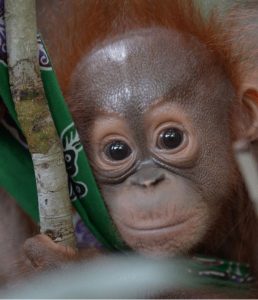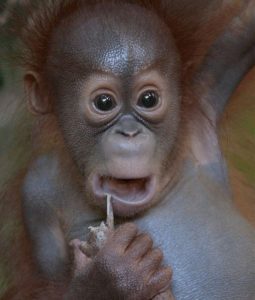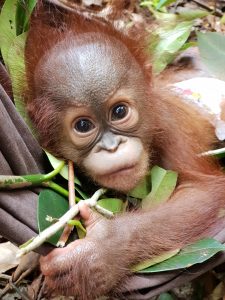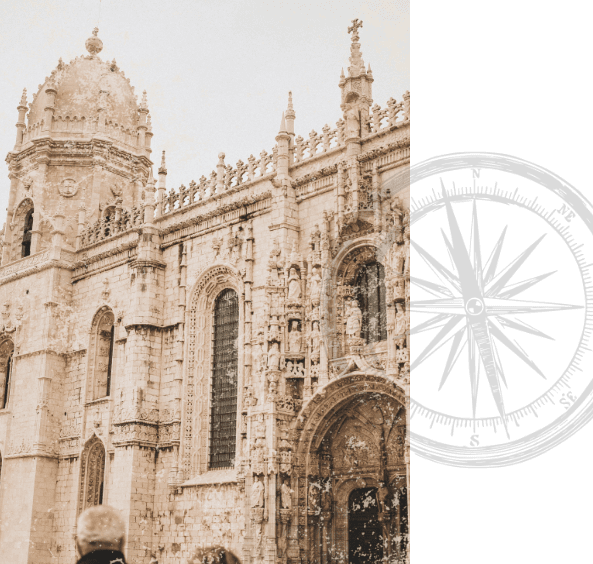I adopted a baby orangutan.
Let me explain.

During Canada’s social isolation measures for COVID-19, I’ve found comfort and peace in previously recorded animal shows. I love veterinary, zoo, and nature documentaries. My newest find is Orangutan Jungle School.
So far, there are two seasons of this heartwarming program (I caught it in Season 2 and am psyched to find out some of the orangutans’ orange stories in Season One!) The documentary follows the daily life of orangutans at Borneo Orangutan Survival Foundation (or BOSFoundation, for short.) This incredible organization rescues orphaned and injured orangutans from vulnerable sites around Borneo, and the world’s pet and entertainment trades. Many of these babies are orphaned because of habitat loss due to palm oil plantations, or poachers that go after their mothers. It’s a heartbreaking reality, and the BOSFoundation is doing important work to protect this endangered species.
Orangutan Jungle School
I felt especially moved by the work being done by the BOSFoundation at Nyaru Menteng, the rehabilitation or “Jungle School” site featured in the documentary series. Every day, workers take care of different orangutan age groups, ensuring they get the nutrition and veterinary care they need. On a daily basis, some orangutans stay in the nursery, while those more than a year old go to “classrooms” in the jungle to learn survival skills.
Orangutans mature slowly, much like humans, and are at least 8 years old when they can survive without their mothers in the wild. During those critical first years, the staff at Nyaru Menteng rehabilitate the orphaned babies and teach them learn how to:
- participate in orangutan social relationships
- forage for food like termites and rubber tree sap
- build a new sleeping nest each night
Critically, the staff at Nyaru Menteng work with communities and key stakeholders to educate people on orangutans, do conservation work, and make development changes to prevent the species from going extinct.
Before wild release, the BOSFoundation gives orangutans up to a couple years on a pre-release island, living as though they’re wild, but still with some food drops and monitoring for social or health issues. Once the orangutans are ready, the workers finally release them back into the wild and cry with both loss and fulfillment.

Years of hard work and devotion
The workers at Nyaru Menteng spend about a decade rehabilitating and releasing orangutans that come in as babies, and many years that come in as kids. This shows an incredible dedication to the cause of these animals and demonstrates the expense of the BOSFoundation to provide the high quality, individualized support each animal deserves. Each time I looked at the eyes of another baby orangutan, and saw their progress at Jungle School, I felt a little more of my heart open up. It was an amazing gift during this time of anxiety and fear. If only there was a little something I could do to give back to these amazing humans and animals.
Orangutan support
I found the BOSFoundation and Orangutan Jungle School websites and quickly made the choice to adopt an orangutan (i.e. provide monetary support for their nutrition and care needs). My mom and I enjoyed a few more episodes of the program together to find my perfect match. Our hearts stirred at the sight of an orangutan baby named Monita.
Monita is a beautiful 2-year-old female orangutan. The BOSFoundtion saved her at only 3 months old from a family that claimed her mother had dropped her (as the documentary explains, no one believes this story.) Thankfully, the the family agreed to give her to the rescue organization to learn how to survive and thrive as an orangutan.
The BOSFoundation gave me an adoption certificate, her history, and some special photos. Since the last season of the documentary series, Monita has become a little bigger and is now enjoying the jungle school playground.
Connection and COVID-19

They also sent me a special thank you message for providing a year’s worth of adoption support for Monita during the time of COVID-19, when expenses and effort are high. The regular Personal Protection Equipment they wear (masks, gloves, etc.) are now at a very high price. But these resources are more important than ever because there’s a fear that orangutans could get the virus. On top of that, the workers responsible for direct orangutan care can’t stay home. I almost cried because my heart felt so full. I had connected with this innocent little creature, and the kind humans working so hard to protect her and all the other orangutans at her side.
How to support the BOSFoundation
If you’d also love to support the BOSFoundation and the orangutans in their care, there are a few different options. You can:
- donate here so they can get the supplies effected by COVID-19
- contribute a regular donation to be used for food, enrichment games, and equipment
- adopt a special orangutan for a 1-month, 6-month, or full-year period, like I did
And if you’d like to watch the adorable program Orangutan Jungle School, check it out on Amazon Prime or a TV channel in your country.
It felt great, during this fraught time of fears around scarcity, to share what resources I do have with others. I honestly feel that I’ve had as much of a positive experience from it as Monita and her carers will. And it’s even better timing that April 22nd was Earth Day. What better moment to protect a little, beautiful slice of our planet. It’s a wonderful experience of connection that serves as an antidote to the distance of social isolation.
And now I can say I’m the mama of a sweet baby orangutan. What a beautiful world.
Looking for some more feel good animal content? Check out my review of puppy yoga!




